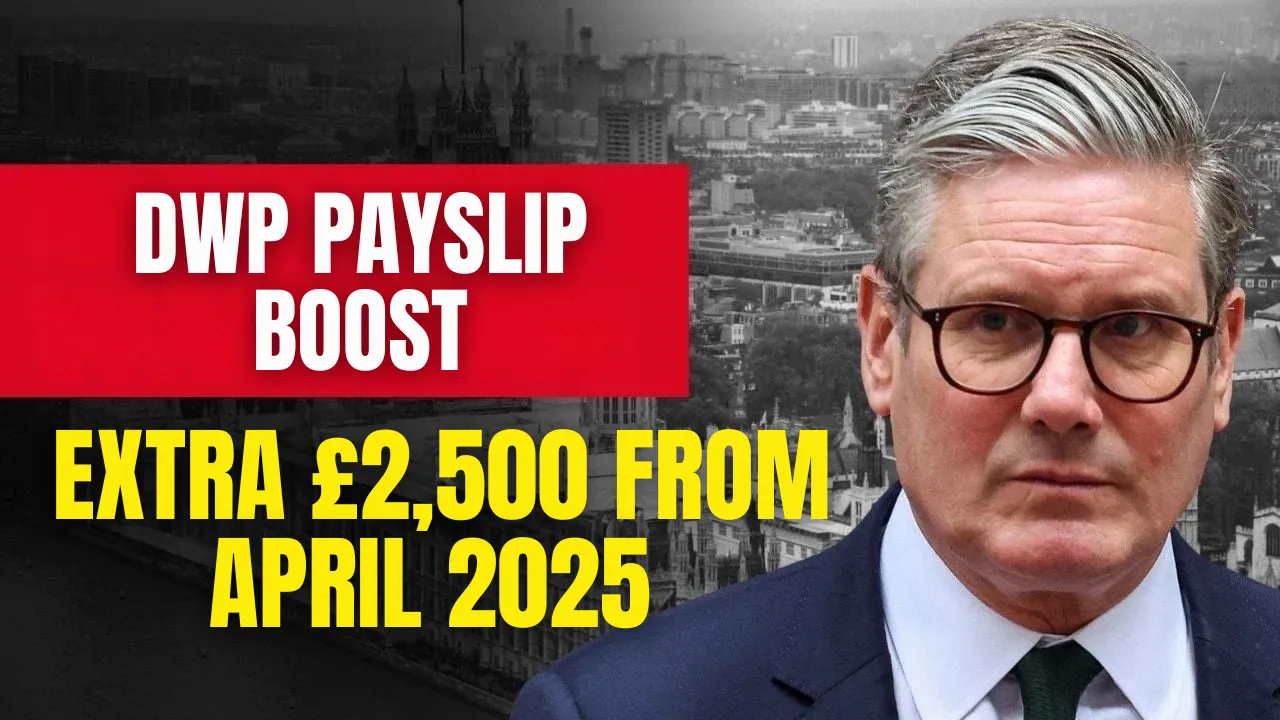DWP Payslip Boost: From April 1, 2025, millions of UK workers are set to receive a major uplift in their earnings as part of a transformative move led by the Department for Work and Pensions (DWP). This development, commonly referred to as the DWP Payslip Boost, promises to inject up to £2,500 extra per year into the pay packets of full-time employees, following a significant rise in both the National Minimum Wage and National Living Wage.
The change is a response to ongoing financial pressures caused by rising living costs, and it’s part of the government’s broader “Plan for Change” to improve living standards, support job growth, and create a more balanced economy.
DWP Payslip Boost 2025
The DWP Payslip Boost isn’t just a wage hike—it’s a strategic national shift. The government aims to make pay fairer across all age groups, remove outdated wage disparities, and ensure that work pays enough to support a decent standard of living.
Younger workers, especially those aged 18 to 20 and apprentices, will see some of the largest cash increases in years. At the same time, full-time employees aged 21 and over will benefit from the enhanced National Living Wage, boosting annual income by as much as £2,500.
Overview of New Wage Rates and Increases
| Worker Category | Old Rate (2024) | New Rate (2025) | Increase |
| National Living Wage (21+) | £11.44 | £12.21 | +£0.77 |
| 18–20 Year Olds | £8.60 | £10.00 | +£1.40 |
| Apprentices | £6.40 | £7.55 | +£1.15 |
| Annual Boost (Estimated) | Up to £2,500 |
Why the DWP Is Increasing Wages
The primary goal of the 2025 wage increase is to support workers who are struggling with rising costs for housing, energy, and basic goods. With inflation continuing to impact household budgets, the DWP Payslip Boost serves as both a financial relief and an investment in a stronger, fairer economy.
Additionally, the new wage structure is designed to:
- Reduce age-based pay gaps
- Encourage workforce participation
- Stimulate local spending and economic activity
- Help businesses retain workers by boosting morale and motivation
Phasing Out Age-Based Wage Bands
One of the most progressive aspects of this reform is the removal of wage disparities based on age. Historically, younger workers were paid less than older colleagues, even when doing the same job. From 2025, that’s changing.
By closing the age pay gap, the government aims to promote fairness in the workplace and ensure younger workers have the same financial opportunities as older employees. This will especially benefit apprentices and young people aged 18–20, who often earn the lowest rates despite rising living costs.
How This Helps the Economy
Higher wages don’t just benefit individuals—they help fuel national economic growth. Here’s how:
- More spending power: Workers earning more tend to spend more, especially in local shops and services.
- Improved productivity: Financial security often leads to improved performance and job satisfaction.
- Reduced turnover: With better pay, workers are more likely to stay with their employer, saving businesses on recruitment and training.
- Greater job market competitiveness: Better wages make the UK a more attractive place to work and do business.
This move also positions the UK ahead of global counterparts like the US, Germany, and Japan when it comes to minimum wage benchmarks.
What This Means for Workers
If you’re earning minimum wage, the DWP Payslip Boost means you should start seeing higher take-home pay from April 1, 2025. To make sure you receive the correct amount:
- Check your payslip regularly starting in April.
- Speak to your employer if your wage has not been updated.
- If you believe you’re being underpaid, contact HMRC or Acas for confidential support at 0300 123 1122.
The government is taking underpayment seriously and encourages workers to report wage issues without fear of retaliation.
How the Government Is Supporting Businesses
While the wage increase is excellent news for employees, it could place financial pressure on small businesses. That’s why the government has outlined a support plan for employers, which includes:
- HMRC guidance on wage adjustments
- Acas advisory services to help with workplace changes
- Transitional economic measures to manage increased payroll costs
This balanced approach ensures that businesses remain sustainable while still providing fair pay.
What Workers Should Do Now
Here’s a quick guide for workers to make the most of this change:
- Know Your Rate
Confirm which wage bracket you fall into and calculate your expected pay increase. - Check Your Payslip
Look at your April 2025 payslip and verify that your employer is paying you the new rate. - Raise Concerns Promptly
If you notice discrepancies, speak to your employer first. If unresolved, report the issue to HMRC or Acas. - Plan Your Finances
Use the increase to cover essentials, reduce debt, or build emergency savings.
The Bigger Picture: Plan for Change
The DWP Payslip Boost is part of a much wider “Plan for Change” that aims to revamp the UK’s economic outlook. Beyond wage reforms, the government is focusing on:
- Expanding access to job training and education
- Supporting job creation and career growth
- Addressing regional income gaps
- Creating a more equitable workforce
Together, these policies are designed to create long-term benefits for both employees and employers, fostering a healthier economy for everyone.
FAQs About the DWP Payslip Boost
How much more will I earn?
If you’re 21 or older and working full time, you could earn up to £2,500 more per year.
Do younger workers benefit too?
Yes. Those aged 18–20 and apprentices are receiving the largest wage increases in cash terms.
What should I do if my wage hasn’t changed?
Speak to your employer first. If the issue isn’t resolved, contact HMRC or Acas.
Why now?
To tackle the ongoing cost-of-living crisis and improve wage fairness across all working age groups.
Is this part of a bigger government plan?
Yes. The Plan for Change includes this wage reform alongside wider efforts for economic fairness, job training, and improved work conditions.
Conclusion
The DWP Payslip Boost is more than just a pay rise—it’s a meaningful shift toward fairer wages and stronger economic stability for UK workers. With up to £2,500 extra per year, millions of employees will have a better chance at meeting the rising costs of daily life. At the same time, businesses will benefit from improved morale, lower turnover, and a more competitive labour market.
Whether you’re a young apprentice or a full-time worker over 21, now is the time to check your wages, understand your rights, and make sure you’re receiving the pay you deserve. This boost is a step in the right direction—toward a fairer, more balanced future for everyone.












